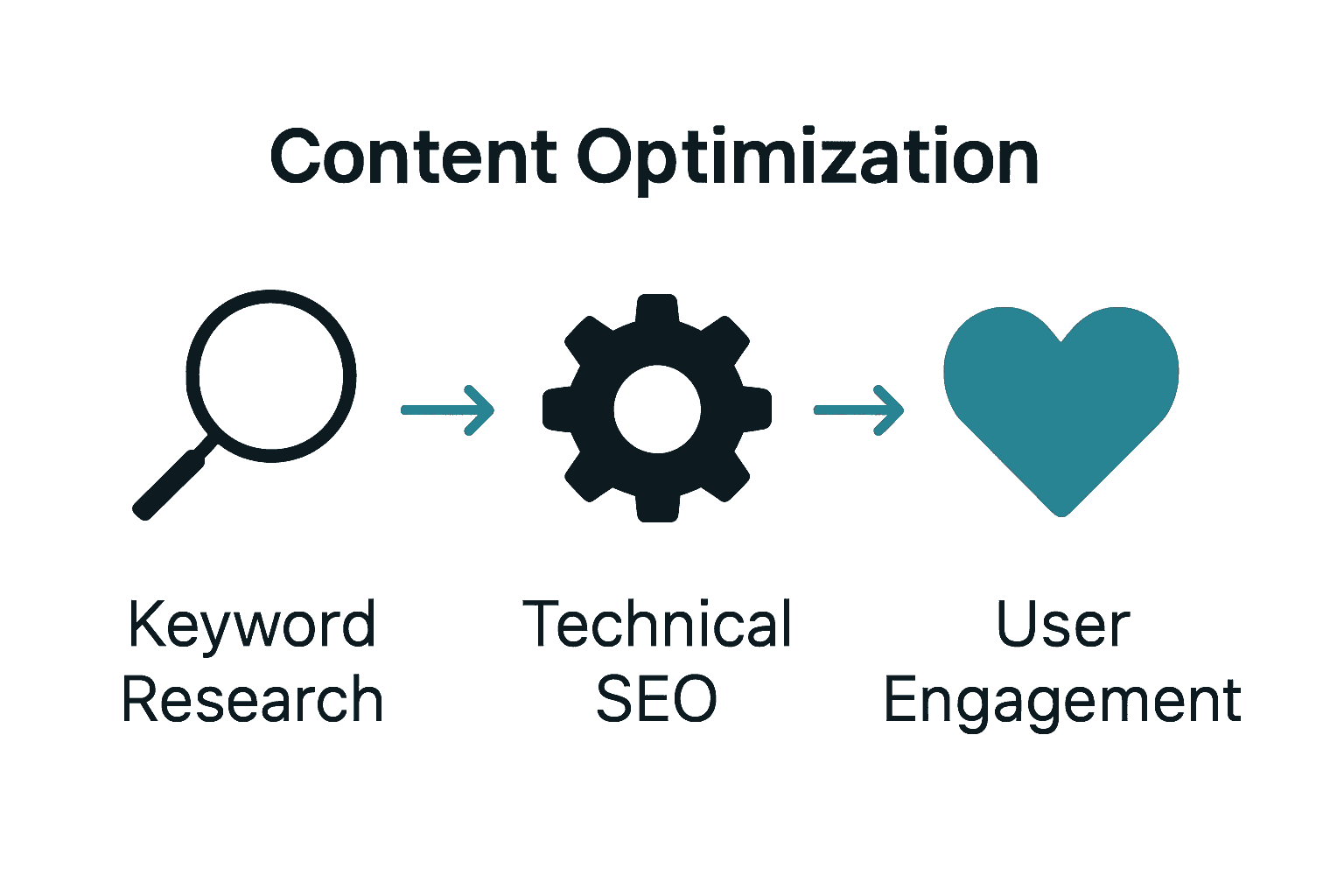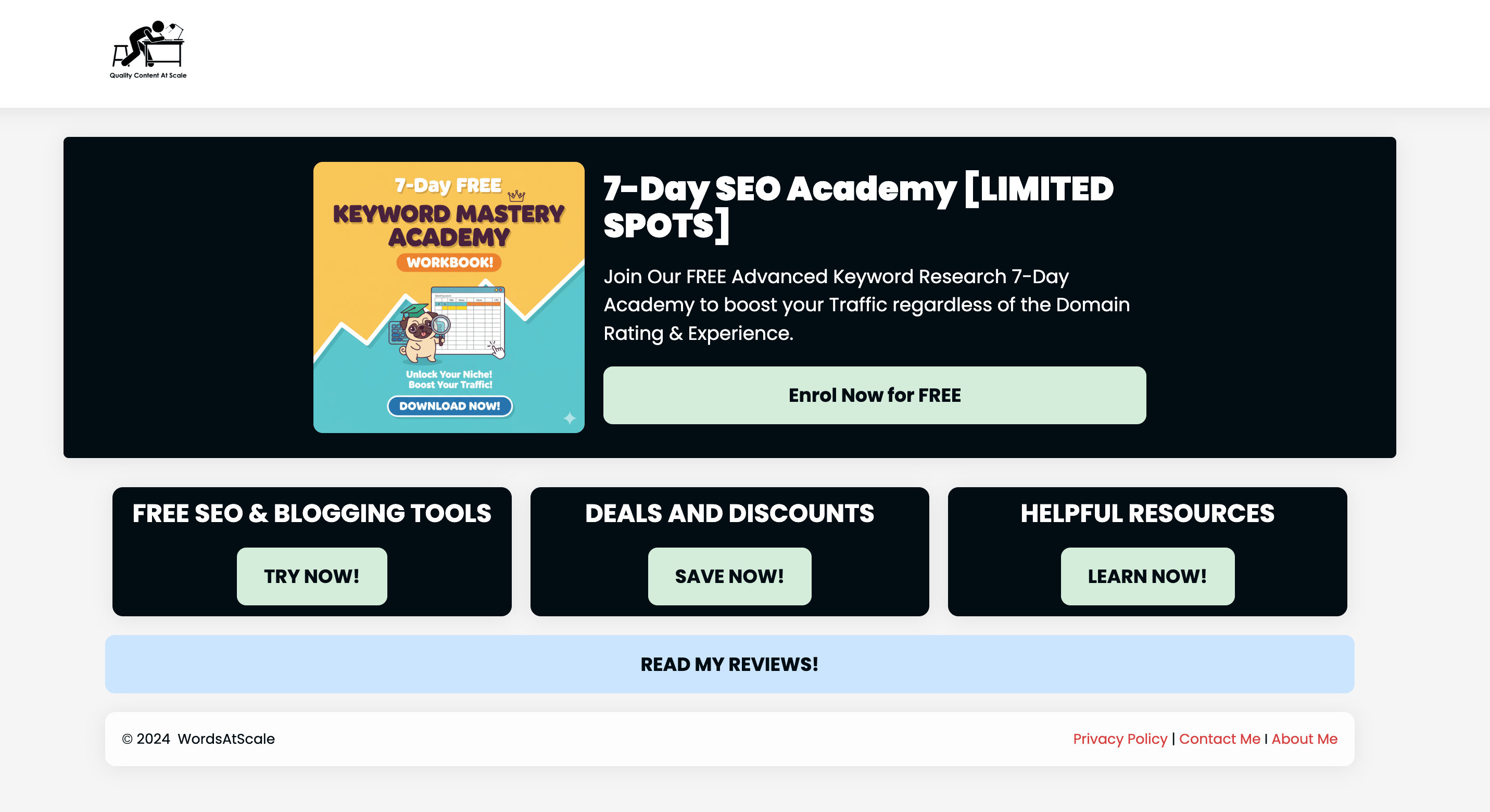Nearly 90 percent of american businesses now prioritize content optimization as part of their digital marketing efforts. In a crowded online world, even the best ideas can get buried unless your content stands out for both search engines and real people. Understanding how to optimize your work means more eyes, higher engagement, and long-term growth that goes beyond basic keyword tricks.
Table of Contents
- Defining Content Optimization And Its Purpose
- Types Of Content Optimization Strategies
- How Optimization Impacts Search Rankings
- Key Benefits For Marketers And Creators
- Common Pitfalls And Mistakes To Avoid
Key Takeaways
| Point | Details |
|---|---|
| Content Optimization Importance | Enhances online content visibility and engagement, driving increased website traffic. |
| Holistic Strategy | Combines technical SEO elements with high-quality content to meet user needs effectively. |
| User Intent Focus | Critical to create content that addresses specific queries and provides meaningful value. |
| Avoid Common Pitfalls | Steer clear of keyword stuffing and low-quality tactics to maintain sustainable search rankings. |
Defining Content Optimization and Its Purpose
Content optimization represents a strategic digital marketing approach designed to enhance online content’s performance, visibility, and engagement. According to Gartner, it is a sophisticated process that employs various techniques to improve search results and rankings while simultaneously automating content management to dynamically create web pages.
Content optimization goes beyond simple keyword placement. Coursera describes it as a comprehensive practice of systematically updating and improving digital content to boost search engine performance, ultimately driving increased website traffic and user engagement. This means transforming existing content into a powerful tool that not only attracts search engines but also provides genuine value to your target audience.
At its core, content optimization involves several critical strategies:
- Enhancing readability and user experience
- Implementing strategic keyword integration
- Improving technical elements like metadata and structure
- Creating content that answers specific user queries
- Ensuring mobile responsiveness and fast loading times
Successful content optimization requires a holistic approach that balances technical SEO requirements with high-quality, meaningful content that genuinely serves user needs. By understanding and implementing these techniques, marketers can create digital assets that not only rank well but also drive meaningful engagement and conversions.


Types of Content Optimization Strategies
Content optimization encompasses multiple strategic approaches designed to enhance digital content’s performance and user engagement. Wikipedia highlights progressive enhancement as a critical strategy that prioritizes core content accessibility, ensuring basic functionality for all users while providing advanced features for those with more sophisticated browsers.
Marketers can leverage several key content optimization strategies to improve online visibility and user experience:
- Technical SEO Optimization: Improving site structure, metadata, and technical elements
- Semantic Content Enhancement: Creating contextually rich, meaningful content
- User Experience (UX) Optimization: Designing content that’s readable, engaging, and easy to navigate
- Multimedia Integration: Incorporating diverse content formats like images, videos, and infographics
As digital landscapes evolve, emerging strategies like Answer Engine Optimization (AEO) are becoming increasingly important. This approach focuses on structuring content to deliver direct, concise answers to user queries, particularly with the rise of AI-powered search and answer engines. By anticipating user intent and providing clear, targeted information, marketers can significantly improve their content’s relevance and discoverability.
Successful content optimization requires a holistic approach that combines technical precision with genuine user value. By implementing these diverse strategies, marketers can create content that not only ranks well in search results but also provides meaningful, engaging experiences for their target audience.
The key is to remain adaptable, continuously analyze performance metrics, and refine optimization techniques based on evolving digital trends and user behaviors.
How Optimization Impacts Search Rankings
Content optimization directly influences search engine rankings through a complex interplay of technical and strategic elements. Wikipedia highlights competitor backlinking as a crucial technique where marketers analyze competing websites’ backlink strategies to inform and improve their own link-building approaches, which can significantly impact search engine positioning.
Key ways content optimization affects search rankings include:
- Relevance Signals: Creating content that precisely matches user search intent
- Technical SEO Elements: Optimizing metadata, headers, and site structure
- Content Quality: Developing comprehensive, authoritative information
- User Engagement Metrics: Improving time on page, click-through rates, and interaction
While some marketers attempt quick fixes, ethical optimization is critical. Wikipedia warns against techniques like article spinning, which artificially generates content variations to manipulate rankings. Instead, successful search ranking optimization requires a holistic approach that prioritizes genuine value, user experience, and high-quality, original content.
Modern search algorithms are sophisticated, rewarding content that demonstrates expertise, authoritativeness, and trustworthiness. By focusing on creating meaningful, well-structured content that genuinely serves user needs, marketers can achieve sustainable search rankings that continue to deliver organic traffic and engagement over time. The most effective optimization strategies are those that align technical precision with authentic, valuable content creation.
Key Benefits for Marketers and Creators
Coursera highlights that content optimization offers transformative advantages for digital creators, dramatically improving online visibility and engagement. By systematically enhancing content, marketers can increase website traffic, establish industry authority, and create more meaningful connections with their target audience.
Key benefits of content optimization include:
- Enhanced Audience Reach: Expanding content visibility across multiple digital platforms
- Improved User Experience: Creating more intuitive, accessible, and valuable content
- Higher Conversion Potential: Developing targeted content that drives user action
- Competitive Differentiation: Standing out in crowded digital marketplaces
Wikipedia emphasizes the emerging trend of Answer Engine Optimization (AEO), which focuses on creating structured, conversational content that aligns with natural language patterns and user intent. This approach not only improves visibility in AI-driven search results but also demonstrates a deep understanding of audience needs and search behaviors.
Ultimately, content optimization is a strategic investment that empowers marketers and creators to transform their digital content from mere information into powerful, engaging experiences. By continuously refining their approach, understanding audience dynamics, and leveraging sophisticated optimization techniques, creators can build sustainable online presence that drives meaningful engagement, trust, and long-term success.
Common Pitfalls and Mistakes to Avoid
Content optimization requires strategic approach and careful execution. Wikipedia warns against article spinning, a deceptive technique that generates superficial and uninformative content which can ultimately frustrate readers and potentially damage search engine rankings by producing low-quality material.
Common content optimization mistakes include:
- Keyword Stuffing: Overloading content with excessive keywords
- Ignoring User Intent: Creating content that doesn’t address genuine audience needs
- Neglecting Content Quality: Prioritizing quantity over meaningful information
- Inconsistent Publishing: Irregular content creation and distribution
Wikipedia highlights that relying solely on competitor backlinking without considering comprehensive SEO factors may not guarantee improved search rankings. Search engines evaluate a complex array of elements beyond simple link acquisition, demanding a more holistic and nuanced optimization strategy.
Successful content creators understand that sustainable optimization is about providing genuine value. Instead of seeking quick shortcuts or manipulative tactics, focus on creating authentic, well-researched content that truly serves your audience’s informational needs. By maintaining high standards of quality, relevance, and user experience, marketers can build long-term credibility and organic growth that transcends temporary algorithmic tricks.
Master Content Optimization with Proven SEO Strategies
The challenges of enhancing online visibility while delivering real value to your audience are at the heart of this guide on content optimization. If you are struggling with creating content that balances keyword integration without keyword stuffing or aiming to boost your search rankings ethically without falling into common pitfalls like article spinning, you are not alone. Marketers and creators face the constant pressure of improving relevance, user engagement, and technical SEO elements all at once. Essential concepts such as Answer Engine Optimization and competitor backlinking can feel overwhelming without the right tools and guidance.
Take control of your content’s performance today by exploring the advanced techniques and practical solutions available at WordsAtScale. Our platform offers a free 7-day advanced keyword research academy that can equip you with actionable skills to optimize content effectively. Combine learning with hands-on experience using our free SEO and blogging tools designed to boost your traffic, regardless of your current domain authority or experience level.

Start transforming your digital content from information to engagement now. Visit WordsAtScale, join our exclusive keyword research academy, and gain instant access to resources that help you rank higher and convert better. Don’t wait to elevate your content optimization strategy with expert insights and proven methods that deliver real results.
Frequently Asked Questions
What is content optimization and why is it important?
Content optimization is a strategic digital marketing approach aimed at enhancing online content’s performance, visibility, and engagement. It improves search engine rankings and user engagement, driving increased traffic to your website.
What are the key strategies for optimizing content?
Key strategies include enhancing readability, integrating strategic keywords, improving technical elements (like metadata and structure), creating content that answers specific user queries, and ensuring mobile responsiveness.
How does content optimization impact search engine rankings?
Content optimization affects search rankings by improving relevance signals, enhancing technical SEO elements, ensuring content quality, and boosting user engagement metrics like click-through rates and time on page.
What are common mistakes to avoid in content optimization?
Common mistakes include keyword stuffing, ignoring user intent, neglecting content quality, and inconsistent publishing. These pitfalls can lead to poor user experience and lower search engine rankings.
Recommended
- The Essential Guide to Content Quality in SEO – WordsAtScale
- SEO Content Creation Guide for Higher Rankings – WordsAtScale
- Content Quality: Complete Guide to Why It Matters – WordsAtScale
- How to Write SEO-Friendly Content for Top Rankings – WordsAtScale
- Marketing de Contenu en Suisse
- Rôle De La Vidéo En Marketing: Guide Complet
